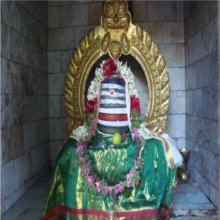Bogar: 2 definitions
Introduction:
Bogar means something in Hinduism, Sanskrit. If you want to know the exact meaning, history, etymology or English translation of this term then check out the descriptions on this page. Add your comment or reference to a book if you want to contribute to this summary article.
Images (photo gallery)
In Hinduism
Shaivism (Shaiva philosophy)
Source: Wisdom Library: ŚaivismBogar is the name of one of the eighteen Siddhars mentioned in the Abhidāna-cintāmaṇi, a 12th century lexicon by Hemacandra. The Siddhars refers to ancient intellectuals of Tamil Nadu and are the teachers of Siddha medicine: an ancient practice of South-India claiming to over 8,000 years old.
According to tradition, Nandi and Agastya learnt the Siddha system of medicine and Śivayoga from Śiva, and imparted it to a number of disciples (eg., Bogar). These Siddhars are united by their philosophy, accepting the human body as the microcosm of the universe, and seeing the human evolution as the ultimate accomplishment of the regenerative power of the Universe.
Source: DSpace at Pondicherry: Siddha Cult in Tamilnadu (shaivism)Bogar was one of the celebrated Tamil Siddhas whose antiquity and biography has merged into fable. He was well versed in poetry and medicine. Some of his works are Bogar yogamārgam, Bogar Elunūru, Bogar Tirumandiram and Bogar Nigaṇḍu.
Bogar is the disciple of Kālaṅgi Nāthar who was one of the pupils of the great Tirumūlar. Tradition says that he was one of those who went overseas and visited a number of places including Rome in search of medicinal herbs.
Bogar is said to have lived during third to fifth centuries C.E., and practiced and taught alchemy. Traditions concerning Bogar cast him either as a Chinese philosopher who came to India for the study of medicine, traveling first to Patna and Bodhgaya before taking up residence in Madras; or as a south Indian Sittar, who traveled to China and taught alchemy to a ruler named Koṅg (Koṅgaṇar?) before returning to south India

Shaiva (शैव, śaiva) or Shaivism (śaivism) represents a tradition of Hinduism worshiping Shiva as the supreme being. Closely related to Shaktism, Shaiva literature includes a range of scriptures, including Tantras, while the root of this tradition may be traced back to the ancient Vedas.
See also (Relevant definitions)
Starts with: Bogara, Bogaradere, Bogaraderige, Bogare, Bogari, Bogaridirugu, Bogarike.
Ends with: Cembogar, Karbogar, Kembogar.
Full-text: Kongumandala, Pulippani, Kannivadi, Mulavarga, Ramappayyan, Taniparai, Karuvurar, Tirumular, Siddhar.
Relevant text
No search results for Bogar; (plurals include: Bogars) in any book or story.



